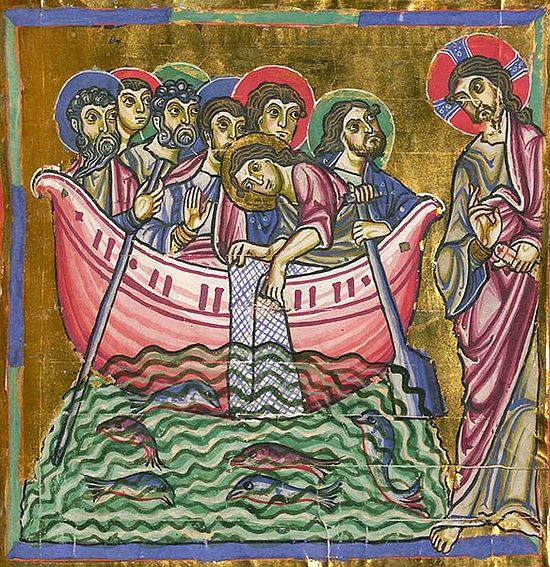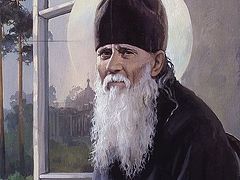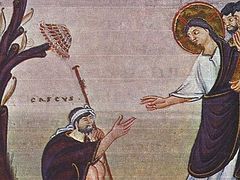 The Miraculous Catch of Fish, 12th Century manuscript, Salzburg. Photo: Pemptousia
The Miraculous Catch of Fish, 12th Century manuscript, Salzburg. Photo: Pemptousia
Fear not; from henceforth thou shalt catch men (Lk. 5:10).
On the Savior’s influence on the people. Luke 5:1-11
The appearance of Jesus Christ in the world, pious readers, immediately drew the heart of the nations to Him. The guileless, sincere people quiсkly beheld in Him the blessed, God-given Supreme Being, and said to Him: Blessed is thewomb that bare Thee, and the paps which Thou hast sucked (Lk. 11:27).
By the fire of the Spirit of God living in Christ, He had an ineffable and irresistible effect on the hearts and souls of men. They felt that not only words (as with the Scribes and Pharisees) but also the power of the grace of God proceeded from His mouth and invisibly but perceptibly acted upon them. And everyone couldn’t help thinking, “Who is He?—this extraordinary reader of the human heart, lover of mankind, and wonderworker? Who is He?”
And here, one day Christ (at the very beginning of His ministry to the people) opened the book of the Prophet Isaiah in the synagogue and read it aloud: The Spirit of the Lord is upon Me, because He hath anointed Me to preach the Gospel to the poor; He hath sent Me to heal the brokenhearted, to preach deliverance to the captives, and recovering of sight to the blind (Lk. 4:18). Having read and closed the book, Christ said: This day is this scripture fulfilled in your ears. And all bare Him witness, and wondered at the gracious words which proceeded out of His mouth (Lk. 4:21-22).
Jesus Christ’s influence on the people grew day by day, and the demons He cast out of the possessed began to recognize His Divine mission to the world. I know Thee Who Thou art; the Holy One of God (Lk. 4:34), one of them said. Thou art Christ the Son of God (v. 41), others said.
The preaching of Christ, the Son of God, about the coming Kingdom of God found a general response, and there appeared a need for other preachers-evangelists for a wide dissemination of this blessed sermon. Jesus Christ chose His evangelists in the persons of the apostles.
Today’s Gospel reading, as we heard, spoke about the first calling of the apostles and the situation in which it took place. It happened on the shore of Lake Gennesaret, where Christ taught the people from the fisherman Simon’s boat. Among His audience were the fishermen Simon Peter and the Sons of Zebedee, James and John. They had been fishing in two boats all night, but caught nothing. And now, weary and grieved by their failure, they hearkened to Christ’s teaching about the approaching Kingdom of God.
And they heard from the Instructor and Teacher a word addressed to Simon: Launch out into the deep, and let down your nets for a draught. And Simon answering said unto him, Master, we have toiled all the night, and have taken nothing: nevertheless at thy word I will let down the net (Lk. 5:4-5). That night’s failure could have hampered Peter’s resolve: If the night hasn’t given success, what could one expect from the day, when fish are generally not caught at all? Had anyone else suggested this daytime fishing, Peter wouldn’t have responded to it. But this catch was suggested by One Who spoke with authority, with such inner strength and confidence that it was impossible not to obey Him.
And, having done this, having let down the nets, they caught so many fish that the nets began to break, and the boats began to sink (vv. 6-7). The sight of the bursting nets, the sinking ships, and the multitude of fish caught was so strong and fearsome that the fishermen were seized by a true terror.
The part of almighty Divine power in this unheard-of catch was so evident that Peter fell at Jesus’ knees and said: Depart from me; for I am a sinful man, O Lord (v. 8).
The miraculous catch opened Peter’s eyes: The One Whom he had earlier called Teacher appeared before him (before his inner perception) as Lord, as the Supreme Divine Being, to Whom is subject the earth, and the water, and people, and fish, and all of nature. How can a sinful man have fellowship with the Lord? Therefore, Peter entreated: “Depart from me, Lord! I am a sinner.” How did Christ answer this supplication? He said: Fear not; from henceforth thou shalt catch men (v. 10).
These words of Christ were understood by the fishermen as a call to follow Him, to serve Him by proclaiming His teaching. They understood that they would have the nets to change from catching fish to catching human hearts and souls. And, without hesitation, they dragged both boats onto the shore, left everything, and followed Him (v. 11). Thus was the calling of the fishermen to the apostolic ministry.
Brothers and sisters! Perhaps someone will ask: Why did it please the Lord to give the fisherman such an unusually rich, excessive catch? It happened so that neither the fishermen nor anyone else could explain the catch as a random coincidence, which could have happened were it a normal size catch. The excessiveness of the catch confirmed the obvious action of the power of God in it. Moreover, the apostles could see in it (this abundant catch) a symbol, an image of that abundant catch of human souls to which Christ called them when He said: Fear not; from henceforth thou shalt catch men.
Brothers and sisters! By this miraculous catch of fish, Jesus Christ disposed the fishermen (Peter, James, and John) towards following Him, towards fulfilling His will—to become fishers of men. And we know that these fishermen became His closest and most loyal apostles.
This miraculous catch of fish entered into their souls and conquered them once and for all for complete obedience to the Savior.
In the Gospel story about this miracle, there is an especially instructive moment for us—when Peter falls to the knees of Jesus Christ, pleading with Him to depart from him as from a sinful man. In these words of Peter the fisherman is expressed the fear of a sinful soul before the purity, holiness, and Divine majesty of the Savior of the world. The awareness of his sinfulness, his unworthiness before God, his fear before Him—this is for us the first condition of faith in God, the beginning of the path of salvation. The fear of the Lord is the beginning of wisdom, says the word of God.
We know from the lives of the saints that the fear of God is truly the beginning of salvation. Thus, St. Pelagia, having heard a homily in church about the Dread Judgment, was filled with the fear of God, and, having distributed all that she had, she left for a monastery and attained a high holy life.
The fear of God and fear of sin should be our constant companions in life, our inner motivations towards repentance, realignment, and continuous prayerful union with God. Let us, like the apostle Peter, more often spiritually and prayerfully fall at the Savior’s knees, at the foot of His Cross and pray that He not leave us, sinful and unworthy, through His longsuffering, and His love and mercy. Amen.



